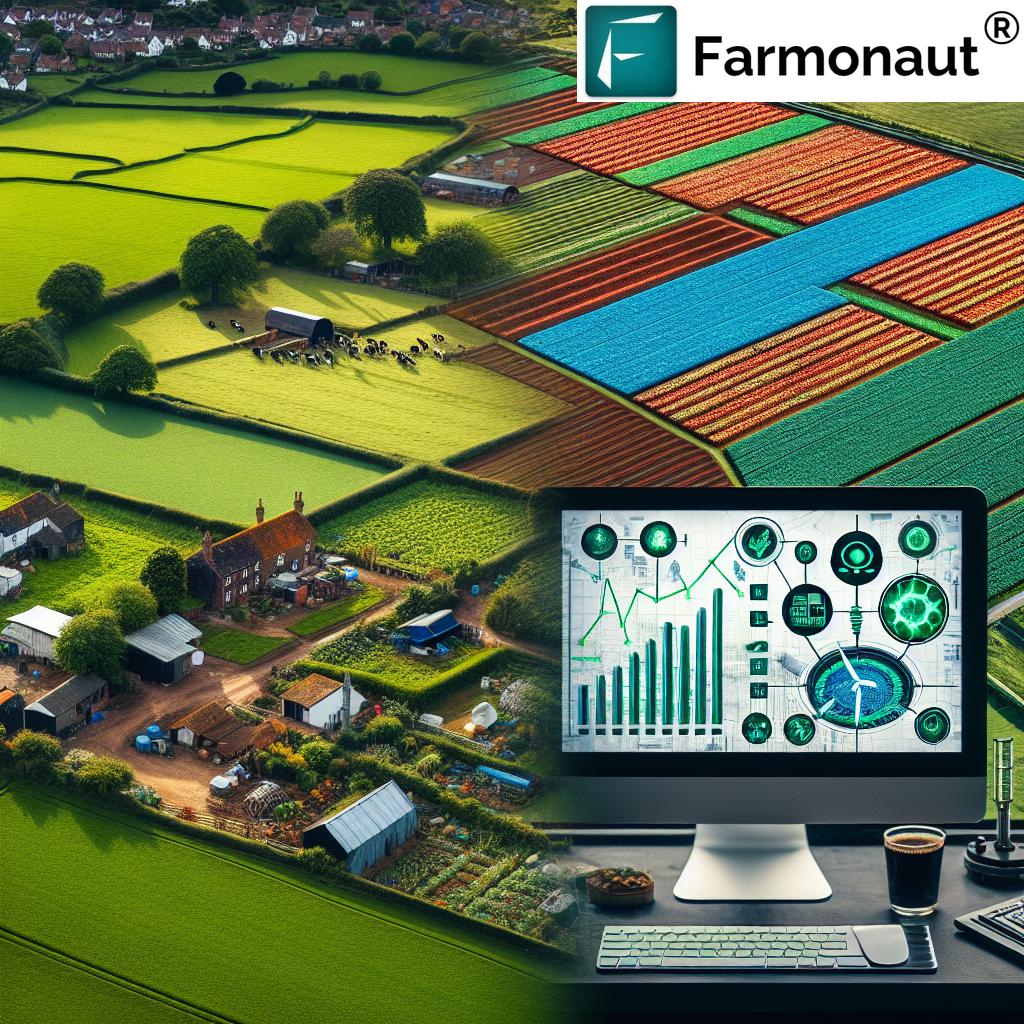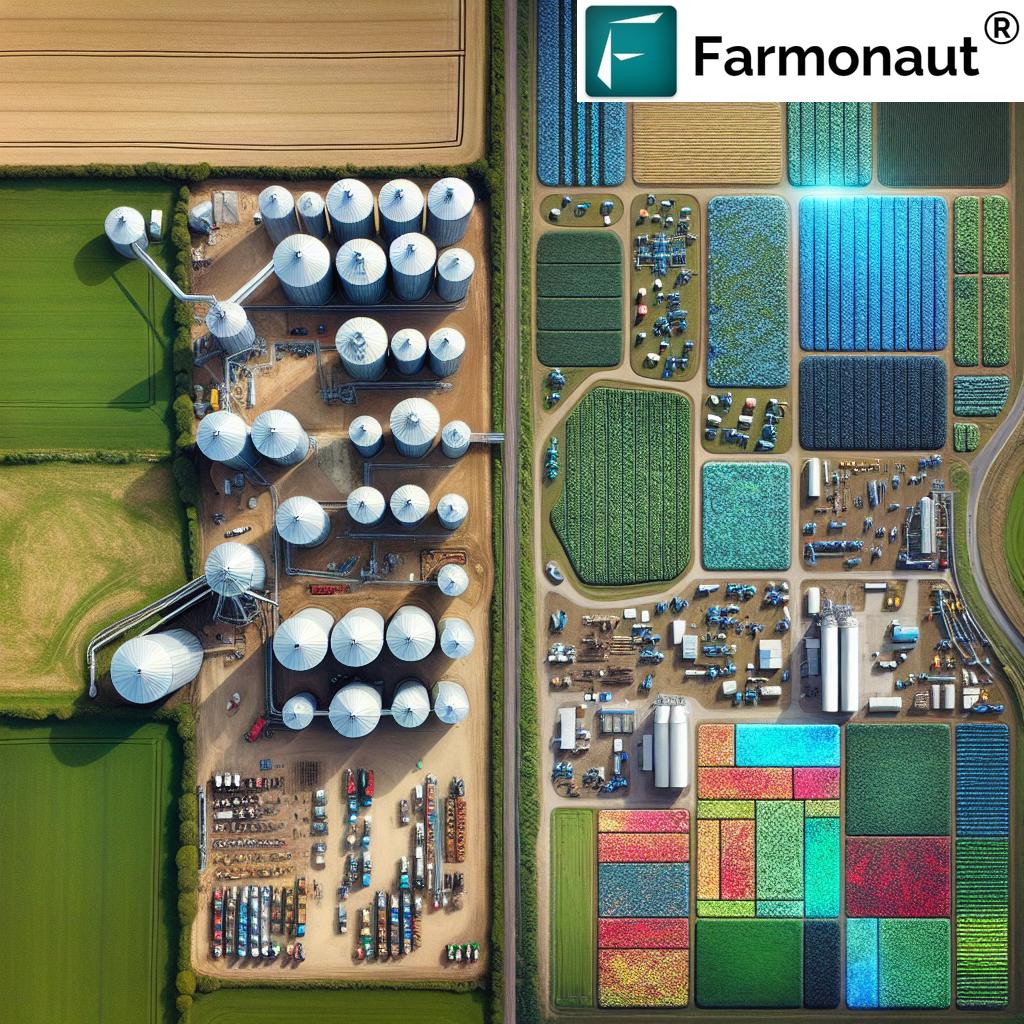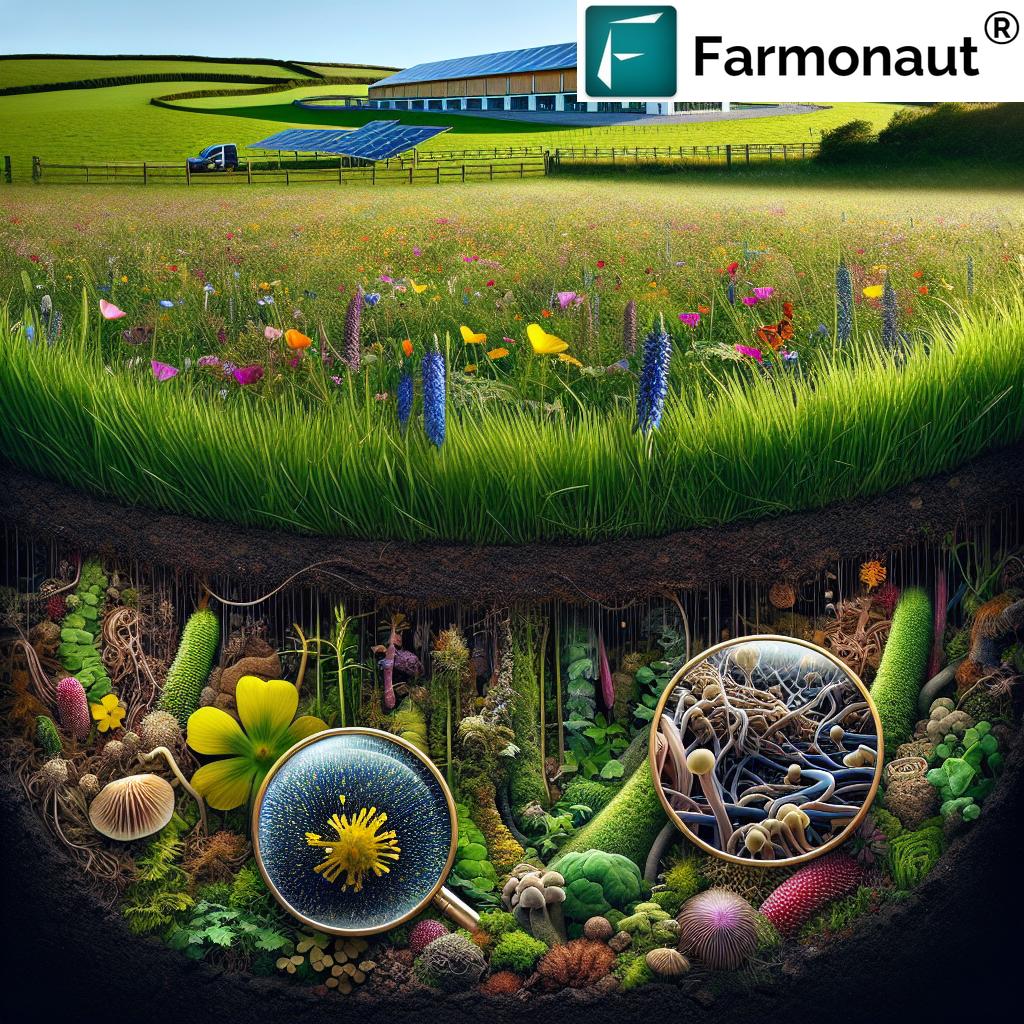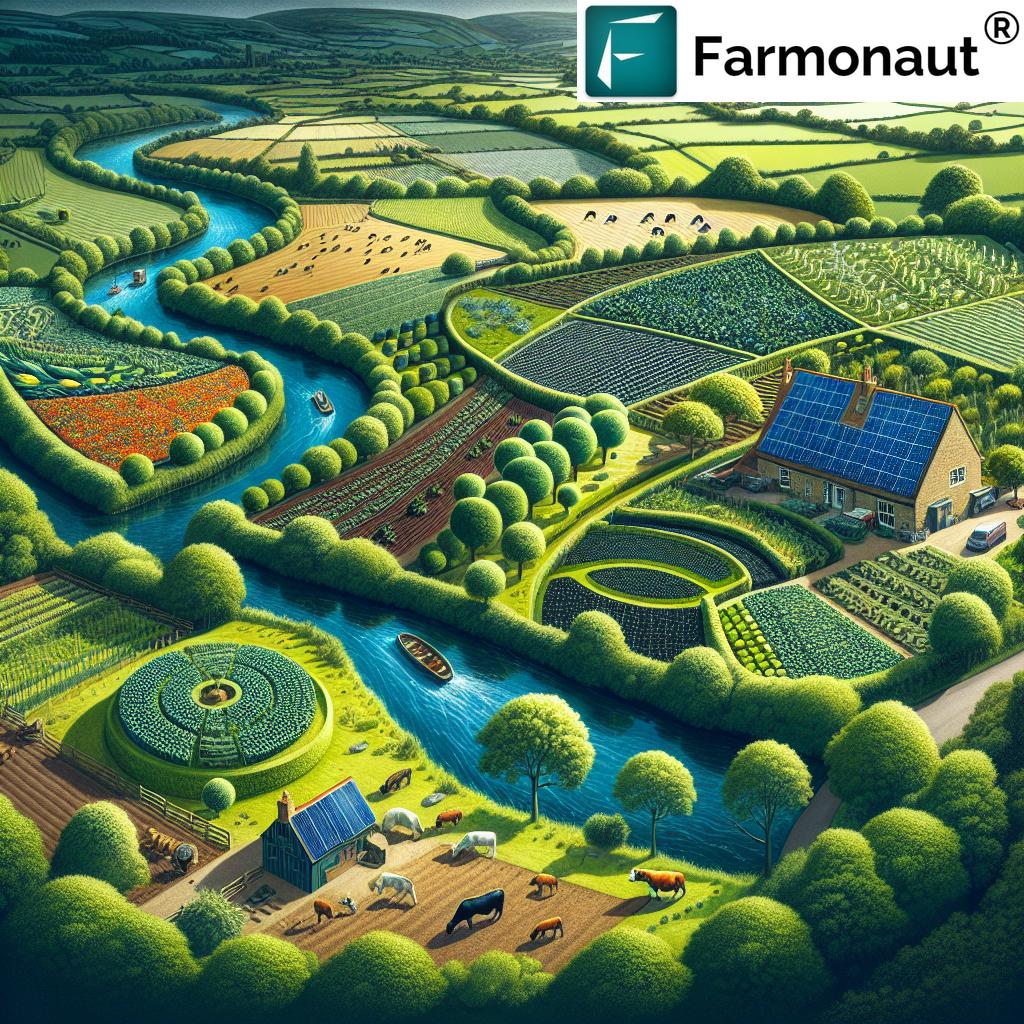Scotland’s Agricultural Future: Bridging the Gap Between Rural Electorate and Political Policy

“Scotland’s agricultural sector faces challenges due to frequent turnover, with DEFRA ministers changing 7 times in 8 years.”
As we delve into the complex landscape of Scotland’s agricultural future, we at Farmonaut recognize the urgent need to address the widening gap between the rural electorate and political policy. In this comprehensive analysis, we’ll explore the challenges facing the Scottish agricultural sector, the impact of frequent ministerial turnover, and the critical need for sustainable farming practices. Our goal is to provide insights that can help bridge this divide and pave the way for a more robust and resilient agricultural industry in Scotland.
The Current State of Scottish Agriculture
Scotland’s agricultural sector is a cornerstone of the nation’s economy and cultural identity. However, it faces numerous challenges that require immediate attention and long-term strategic planning. These challenges include:
- Climate change impacts on crop yields and livestock
- Brexit-related uncertainties in trade and subsidies
- Labor shortages, particularly in the horticulture industry
- Technological adaptation and digital transformation
- Balancing productivity with environmental sustainability
To address these issues effectively, it’s crucial that political policies align with the needs and experiences of the rural electorate. However, the frequent turnover of DEFRA ministers has led to a lack of continuity in agricultural governance, hindering progress and creating uncertainty among farmers and rural communities.
The Impact of DEFRA Minister Turnover
The frequent changes in DEFRA leadership have had significant repercussions on the agricultural sector. With seven ministers in eight years, the development and implementation of coherent, long-term strategies have been severely hampered. This instability has led to:
- Inconsistent policy direction
- Delays in crucial decision-making processes
- Lack of follow-through on initiatives
- Reduced confidence among farmers and rural businesses
To illustrate the impact of this turnover, let’s consider the following table, which compares key agricultural policy proposals across major Scottish political parties:
| Policy Area | SNP | Scottish Conservatives | Scottish Labour | Current Status |
|---|---|---|---|---|
| Renewable energy incentives for farms | Increased subsidies for on-farm renewable projects | Tax breaks for green energy investments | Grants for community-owned renewable schemes | Limited support, primarily through UK-wide schemes |
| Seasonal worker policies | Devolved immigration powers to address labor shortages | Expanded Seasonal Agricultural Workers Scheme | Focus on local workforce development | UK-wide scheme with limited quotas |
| Agricultural apprenticeship programs | Increased funding for agricultural colleges | Employer-led apprenticeship schemes | Integration of digital skills in apprenticeships | Underfunded and underutilized |
| Rural development strategies | Investment in rural broadband and infrastructure | Reduced regulations for rural businesses | Community-led development initiatives | Fragmented approach with varying regional success |
| Horticulture industry support | Grants for greenhouse technology | Export promotion for Scottish produce | Urban farming initiatives | Limited support, facing significant challenges |
This comparative analysis highlights the diverse approaches to agricultural policy across Scotland’s political landscape. However, the frequent changes in leadership have made it difficult to implement and sustain these proposals effectively.
Bridging the Gap: Key Recommendations
To address the disconnect between rural electorate needs and political policy, we propose the following recommendations:
- Incentivize Renewable Energy for Farms: Implement a comprehensive scheme to support farmers in adopting renewable energy solutions. This not only reduces carbon footprints but also provides additional income streams for rural communities.
- Reform Seasonal Worker Policies: Develop a flexible, Scotland-specific approach to seasonal labor that addresses the unique needs of the agricultural sector while ensuring fair treatment of workers.
- Improve Agricultural Apprenticeship Programs: Invest in modernizing apprenticeship schemes to incorporate digital skills and sustainable farming practices, making agriculture an attractive career option for young Scots.
- Cross-Party Cooperation on Rural Development: Establish a non-partisan rural development committee to ensure continuity in policy-making regardless of political changes.
- Enhance Food Security Indicators: Develop robust metrics to monitor and improve Scotland’s food security, reducing reliance on imports and bolstering local production.
The Role of Technology in Agricultural Policy
At Farmonaut, we believe that technology plays a crucial role in shaping the future of agriculture. Our satellite-based farm management solutions offer valuable insights that can inform policy decisions and help farmers adapt to changing conditions. For instance, our real-time crop health monitoring can provide policymakers with accurate data on the state of Scottish agriculture, enabling more targeted and effective interventions.
Explore our solutions:
Sustainable Farming Practices: A Path Forward
Implementing sustainable farming practices is crucial for the long-term viability of Scottish agriculture. These practices not only benefit the environment but also improve farm productivity and resilience. Key areas to focus on include:
- Precision agriculture techniques
- Soil health management
- Water conservation strategies
- Integrated pest management
- Biodiversity promotion
By incorporating these practices into agricultural policy, Scotland can position itself as a leader in sustainable farming while ensuring the long-term prosperity of its rural communities.
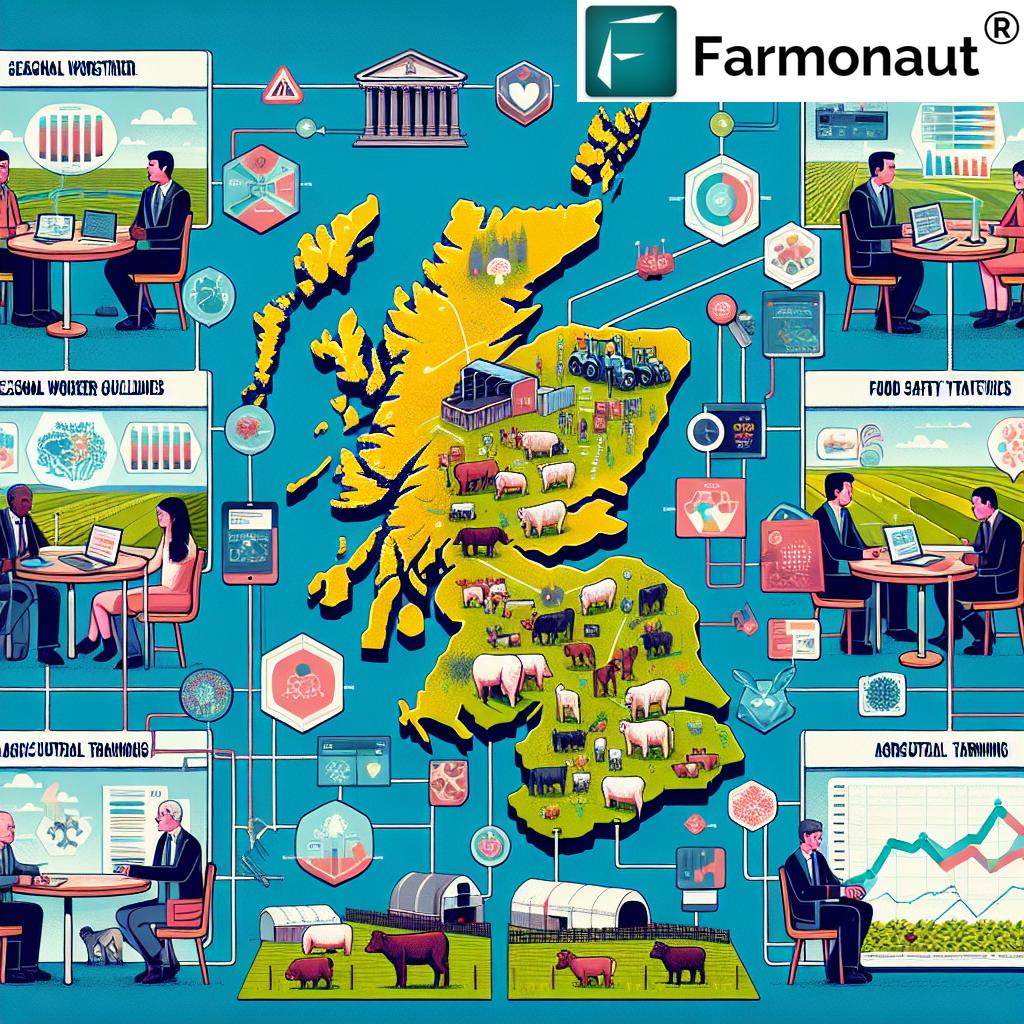
“The Lord’s Report on Horticulture highlights that 40% of UK food is imported, emphasizing the need for improved domestic production.”
The Horticulture Industry: Challenges and Opportunities
The horticulture sector in Scotland faces unique challenges that require targeted policy interventions. The Lord’s Report on Horticulture has highlighted several key issues:
- Labor shortages due to Brexit and changing migration patterns
- Increased competition from imported produce
- Climate change impacts on crop yields and growing seasons
- Need for technological innovation in greenhouse farming
To address these challenges, we recommend:
- Investment in Greenhouse Technology: Provide grants and subsidies for modernizing greenhouse facilities, enabling year-round production and reducing reliance on imports.
- Skill Development Programs: Implement specialized training programs to build a skilled local workforce for the horticulture industry.
- Research and Development Funding: Increase investment in horticultural research to develop climate-resilient crop varieties and innovative growing techniques.
- Marketing Support: Develop campaigns to promote Scottish-grown produce both domestically and internationally.
Food Security: A National Priority
The fact that 40% of UK food is imported underscores the urgent need to improve domestic production and enhance food security. Scotland, with its diverse agricultural landscape, has the potential to significantly contribute to national food security. To achieve this, we propose:
- Diversification of Crop Production: Encourage farmers to grow a wider range of crops suitable for the Scottish climate, reducing reliance on imports.
- Investment in Food Processing Infrastructure: Develop local processing facilities to add value to Scottish agricultural products and reduce post-harvest losses.
- Promotion of Urban Farming: Support initiatives that bring food production closer to urban centers, such as vertical farming and community gardens.
- Strengthening Local Food Systems: Develop policies that support short supply chains and direct farm-to-consumer marketing channels.
By focusing on these areas, Scotland can improve its food self-sufficiency while creating new economic opportunities in rural areas.
The Importance of Cross-Party Cooperation
Addressing the complex challenges facing Scottish agriculture requires a unified approach that transcends party lines. We advocate for:
- Establishment of a non-partisan agricultural advisory board
- Regular cross-party dialogues on rural development strategies
- Joint fact-finding missions to understand on-ground realities
- Collaborative policy development processes involving all stakeholders
This approach can help ensure policy continuity and create a more stable environment for farmers and rural businesses to thrive.
The Role of Digital Technology in Agriculture
Digital technology is revolutionizing agriculture, and its adoption is crucial for the future of Scottish farming. At Farmonaut, we’re at the forefront of this digital transformation, offering solutions that can significantly enhance farm productivity and sustainability. Our satellite-based crop monitoring and AI-powered advisory systems provide farmers with valuable insights to optimize their operations.
Explore our API for developers: Farmonaut API
Access our API documentation: API Developer Docs
To fully leverage the potential of digital agriculture, we recommend:
- Providing grants for farmers to adopt digital farming technologies
- Improving rural broadband infrastructure to enable smart farming practices
- Incorporating digital skills training in agricultural education programs
- Supporting agritech startups and innovation hubs in rural areas
Addressing the Skills Gap in Agriculture
The agricultural sector in Scotland faces a significant skills gap, which needs to be addressed to ensure its long-term sustainability. We propose the following measures:
- Modernize Agricultural Education: Update curricula in agricultural colleges to include the latest technologies and sustainable farming practices.
- Promote Agriculture as a Career: Launch campaigns to attract young people to agricultural careers, highlighting the sector’s technological advancements and importance to society.
- Develop Specialized Training Programs: Create short-term courses and workshops to help existing farmers update their skills and knowledge.
- Encourage Knowledge Transfer: Establish mentorship programs pairing experienced farmers with newcomers to the industry.
The Future of Scottish Agriculture: A Vision
As we look to the future, we envision a Scottish agricultural sector that is:
- Technologically advanced and digitally connected
- Environmentally sustainable and climate-resilient
- Economically viable and globally competitive
- Socially responsible and community-oriented
- Diverse in its produce and farming practices
Achieving this vision requires a concerted effort from all stakeholders – policymakers, farmers, technology providers, and consumers. By bridging the gap between the rural electorate and political policy, we can create an agricultural future that benefits all of Scotland.
Conclusion: A Call to Action
The future of Scottish agriculture hangs in the balance. The challenges are significant, but so are the opportunities. By addressing the disconnect between rural needs and political policy, investing in sustainable practices, and embracing technological innovation, Scotland can build a resilient and thriving agricultural sector.
We call on policymakers to listen to the rural electorate, engage with farmers and industry experts, and develop long-term strategies that transcend political cycles. We urge farmers to embrace new technologies and sustainable practices. And we encourage all Scottish citizens to support local agriculture and recognize its vital role in the nation’s economy and cultural identity.
Together, we can create an agricultural future for Scotland that is prosperous, sustainable, and aligned with the needs of its rural communities.
FAQs
- Q: How can Scottish farmers adapt to climate change?
A: Scottish farmers can adapt to climate change by implementing sustainable farming practices, diversifying crops, investing in water management systems, and utilizing precision agriculture technologies. - Q: What impact has Brexit had on Scottish agriculture?
A: Brexit has led to changes in trade regulations, subsidies, and labor availability, creating challenges for Scottish farmers in accessing European markets and seasonal workers. - Q: How can technology improve Scottish agriculture?
A: Technology can improve Scottish agriculture through precision farming techniques, automated machinery, data-driven decision-making, and improved crop monitoring systems, all of which can increase efficiency and yields. - Q: What are the main challenges facing the Scottish horticulture industry?
A: The main challenges include labor shortages, competition from imports, climate change impacts, and the need for technological upgrades in greenhouse facilities. - Q: How can Scotland improve its food security?
A: Scotland can improve its food security by increasing domestic production, diversifying crops, investing in food processing infrastructure, and strengthening local food systems.













